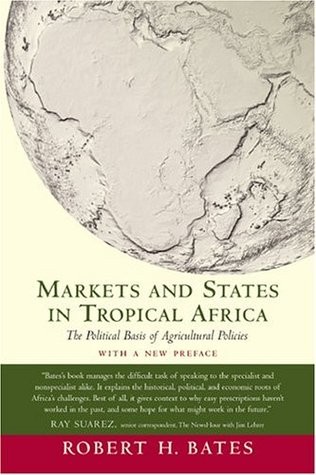The Political Basis of Agricultural Policies
Why are policies created they way they are? This question is particularly interesting when the policies do not appear to function well. It may be that the 'failing' policies are not actually failing, but serving another, often unstated, purpose. A classic, essential read on this question is "Markets and States in Tropical Africa: The Political Basis of Agricultural Policies" by Robert H. Bates (1981). The author explains that the book "seeks to go beyond the position of agricultural economists by asking the obvious question: Why should reasonable men adopt public policies that have harmful consequences for the societies they govern? In answering this question, it looks for the social purposes that lead policy-makers to intervene in agricultural markets. Above all, it examines the political calculations that induce governments to intervene in ways which are harmful to the interests of most farmers" (p. 3).
"When African governments intervene in markets, they often do so in ways that harm the short-run interests of most farmers. On the one hand, by sheltering domestic industries from competition, they increase the prices that farmers must pay for goods from the urban areas. One the other, through the use of state power, they lower the prices farmers receive for their products; alternatively, they compete with them in supplying food to the urban markets. And the benefits of subsidies they do confer on farm inputs are reaped by the richer few" (p. 81). Further, these same programs are used to secure power, as incentives and disincentives (p. 110, 112, 117).
The problem of the decision maker is that they "want to move resources from agriculture to industry; and therefore they set prices in markets in order to capture resources from agriculture. Moreover, the governments need resources with which to implement these development programs; and to achieve their objectives, they need foreign exchange. In nations in which agriculture is the greatest source of income and the principal source of exports, it is natural that they should seek to levy revenues from the rural sector… Governments want to stay in power. They must appease powerful interests. And people turn to political action to secure political advantages – rewards they are unable to secure by competing in the marketplace. This book stresses the role of such factors in the formulation of agricultural policy." (p. 4)
Essentially, Bates outlines how governments have used policy to harm the majority of farmers, in seeking to serve other objectives.
While this book is good, it is unlikely it would pass the peer review process today. The author uses a few cases to generalize about "governments of Africa", pulling examples to prove points where most suitable. It is, nonetheless, a important read – one that set the groundwork for much of the political economy research for agricultural policy.

